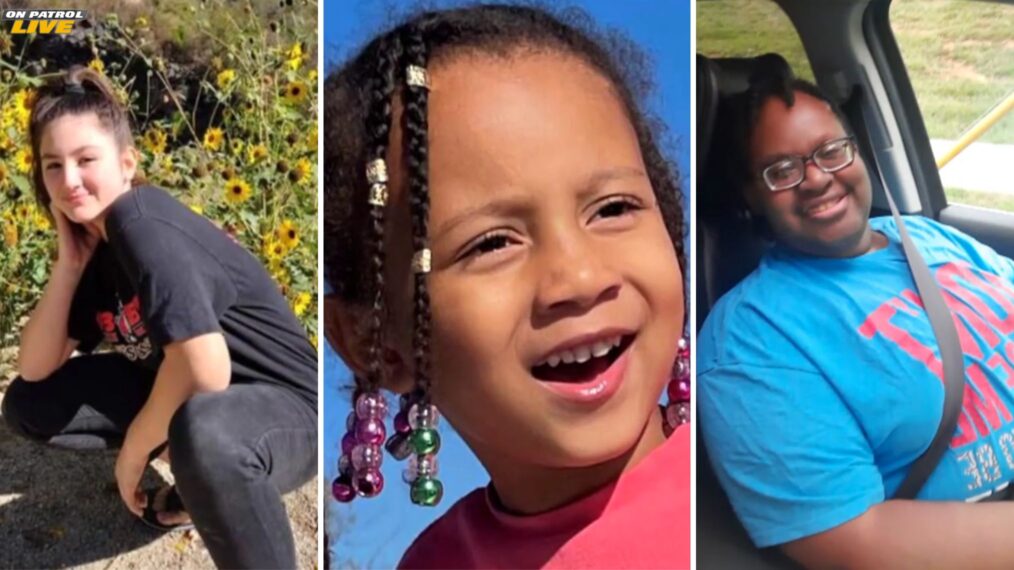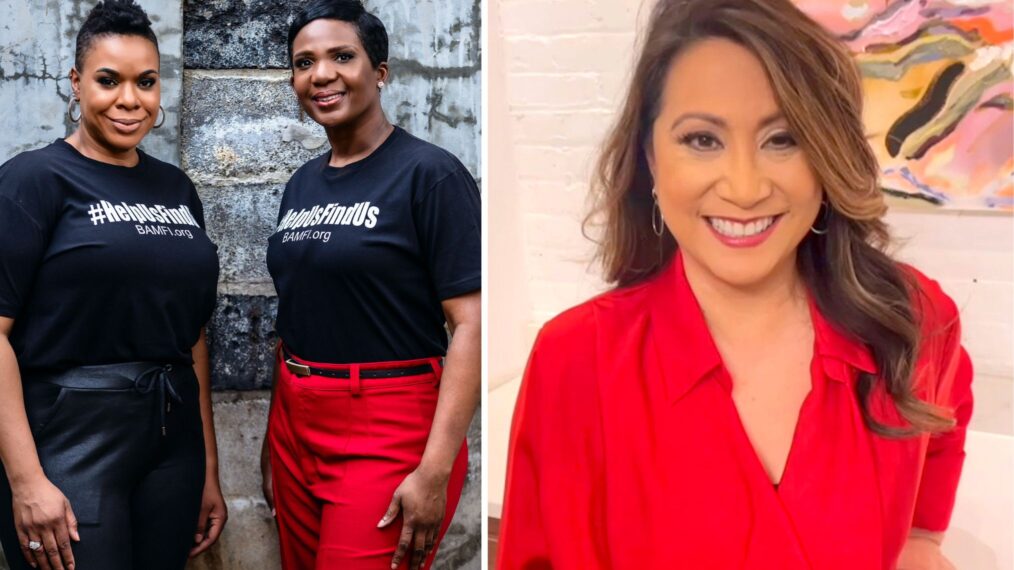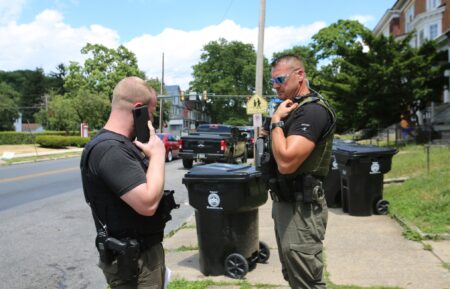How ‘On Patrol Live’ & Viewers Have Helped Find 24 Missing People

On Patrol Live on REELZ adheres to live news-gathering procedures while its cameras capture the daily duties of patrolling police officers in real time for its audience.
Alongside this, host Dan Abrams, Sgt. Sean Larkin and Deputy Sheriff Curtis Wilson spotlight ongoing missing persons cases and encourage viewers to reach out to the Black & Missing Foundation (BAMFI), the National Center for Missing & Exploited Children (NCMEC), or local law enforcement hotlines if they have any information. As of writing, the total number of people that have been found after being featured on On Patrol: Live has risen to 24 people.
They include 14-year-old Boise, Idaho teen Alyssa Jones (pictured above left) who was missing for three months and was found the same weekend her segment aired. Smyrna, Georgia’s Majesty Williams (pictured center) was four years old when her father reported her missing and was found two years later in Mexico with her mother thanks to the assistance of the show. 32-year-old Shakiyla Stepney (pictured right), who suffers from a disability, went missing for months and was found just days after being featured on the segment.
“We’re incredibly proud that in just one year of On Patrol: Live being on air, 24 people whose cases appeared on our ‘Missing’ segments have been recovered safely,” said Executive Producer John Zito just a few weeks prior. “Missing persons cases are among the most heart-wrenching issues we see while documenting the work of law enforcement and a major reason why we wanted to work with NCMEC and BAMFI. That OPL can aid in searches by broadening the exposure of cases, and by extension, the reach of these two invaluable organizations, is beyond gratifying. Our viewers are so invested in getting the word out on social media via #OPNation, and we’re committed to continuing this work and, hopefully, helping effect real-world positive change for these families.”

Derrica Wilson (L), Natalie Wilson (R), Angeline Hartmann (REELZ)
Derrica Wilson, co-founder & CEO of BAMFI, and NCMEC’s Director of Communications Angeline Hartmann (America’s Most Wanted) discussed with us the importance of their respective organizations, their missions, details on the stories mentioned above, the powerful effect of social media, and what you can do to help reunite families.
In your own words, can you talk about the inception of how BAMFI came to be and what you do as an organization?
Derrica Wilson: So the Black and Missing Foundation came into existence 15 years ago; a young lady named Tamika Huston went missing from my hometown of Spartanburg, South Carolina, in 2004. And despite the fact that her aunt worked in media relations, she too struggled to garner mainstream coverage for her niece’s disappearance, and in 2005, Natalie Holloway went missing, and if you say her name alone, it resonates with everyone. […] This really was an issue that was impacting black and brown communities. And when we started the organization in 2008, […] we decided to channel our professions; my background is in law enforcement, and Natalie’s background, who is also the co-founder, is media relations. And those are two critical professions that are needed in finding and bringing our missing home. I do want to make it very clear that our efforts are not to dishonor any community; we want to even to the playing field. Less isn’t more because every person that’s missing deserves the coverage; they deserve law enforcement’s resources.
How do local law enforcement and local news sometimes mishandle missing person cases and the discrepancies between someone white vs. a person of color?
Sadly, when it comes to families in the black and brown communities going to gatekeepers, who are law enforcement, oftentimes, their cases are classified as runaways. And runaways do not meet the criteria to initiate an Amber Alert. And really, it doesn’t seem as if there’s a sense of urgency in finding them. It’s this perception that whatever happens to that child, whether it’s male or female, they brought it on themselves because they decided to run away. That is the perception of society. When it comes to adults, our organization covers adults as well. Their cases are oftentimes criminalized; they’re viewed as criminals. And that is far from the truth. We want our community to see that these are valuable members of our community; they’re mothers and fathers, they’re sisters and brothers, sisters and daughters. And again, they need all of us to help find them all.
How does On Patrol: Live, a show both utilizing broadcast/streaming TV and law enforcement, help to amplify stories like this?
It’s through our new two segments on On Patrol: Live we have been able to amplify cases to a broader audience that would otherwise be under the radar. And then the viewers, they’re the members of the community. We have been able to reunite individuals with their families as we share guidance with law enforcement. To date, we have put in two individuals that have been found that were featured on the show. So it really shows that this law police show is amplifying these cases to a broader audience. Those community members who are viewing and sharing information have resulted in success for not just the Black and Missing Foundation but also the National Center for Missing and Exploited Children.
[cnx_script_code]PHNjcmlwdCBpZD0iNmNkZTYwMmMxN2M1NDM2OWI4YzMwZmUxZmE3ZGFiMDUiIGNsYXNzPSJjbngtdmlkZW8tZW1iZWQiPgoobmV3IEltYWdlKCkpLnNyYyA9ICdodHRwczovL2NhcGkuY29ubmF0aXguY29tL3RyL3NpP3Rva2VuPTcwMTEyNzM3LTQzOWQtNGRmMi04YjBkLWMzN2Q3Y2FhMDdhOCZjaWQ9MWZmZTYzZGUtZWI1My0xMWU5LWI0ZDItMDY5NDg0NTJhZTFhJzsKICBjbnguY21kLnB1c2goZnVuY3Rpb24oKSB7CiAgICBjbngoewogICAgICBwbGF5ZXJJZDogIjcwMTEyNzM3LTQzOWQtNGRmMi04YjBkLWMzN2Q3Y2FhMDdhOCIKLCAgICAgIG1lZGlhSWQ6ICJkNDNmNWNkMy1mYjFmLTRmNjMtYTkxNy01ZGIzNmE0Y2U3MGUiCiAgICB9KS5yZW5kZXIoIjZjZGU2MDJjMTdjNTQzNjliOGMzMGZlMWZhN2RhYjA1Iik7CiAgfSk7Cjwvc2NyaXB0Pg==[/cnx_script_code]
Could you touch on a few successful stories of finding people of color since joining On Patrol: Live?
Yes. So you know, we’ve had some successes, and some of the cases that we cover are some of the same ones that the National Center has covered as well. One case in particular, we had a case where a young woman [Shakiyla Stepney] with a disability had been missing for a few weeks, and her mother was at her wit’s end trying to find her. And we were able to highlight her case, share it on the show, and get information, get tips, and we’re happy to report that she was one of those success stories. What we want people to understand is that we have seen miracles happen. And as you see the successes […], some of them have been missing for an extended period of time. But what we don’t want families to do is give up hope. We know that someone out there knows something. And we just need that one person to come forward with information. And I just think that with everyone’s collective efforts, that is how we’re able to have such a high number at this point of success with our collaboration.
How has social media helped in these situations to help recover missing people?
We understand that not every case is going to meet the five and 10 o’clock news cycle; we understand that not every case is going to amplify to mainstream media. So, we have been able to utilize social media to get to the masses. And having an understanding that if a person is missing, let’s say, in Virginia, it doesn’t mean that person is in Virginia; they can be in Tennessee, they can be in Texas, California, and being able to get that information out there instantly.
As a liaison between the police and families, how do you help those who are grieving?
Well, one thing that we see in our community in the black and brown community is that oftentimes, these families are taking matters into their own hands, especially when they feel as if law enforcement is failing them {…] or not taking the cases seriously. So one of the things that we do is we actually create flyers for those family members with our contact information as well as law enforcement because what we have seen is that taking matters into their own hands, they’re putting their personal information out there. Sadly, while they’re in that unknown stage, or that grieving phase, looking for their loved ones, they’re also being victimized. They’re getting those scam and ransom calls. We’ve had families that lose so much because people […] are preying on their vulnerability. But we wanted to help them in that aspect of creating these flyers immediately. So they could have something to share and know that they’re not walking this path, this journey, alone.
#MISSING: #OPNation, Carlethia “Carlee” Russell may be in danger and we need your help to find her. If you have any information contact BAMFI at 1-877-97-BAMFI / 1-877-972-2634 #HelpUsFindUs #HelpUsFindCarlee #Urgent #Alabama #OPLive #OPNation #OnPatrolLive #CarleeRussell… pic.twitter.com/cPikhExp7D
— REELZ (@ReelzChannel) July 16, 2023
We’ve been discussing the media perpetuating stereotypes and how difficult it is to get coverage for missing black and brown people. Can you touch on the Carlethia “Carlee” Russell situation, who, of course, went missing in an apparent kidnapping that she turned out to admit was a lie? Why did that story, out of all missing stories involving black and brown, get coverage?
What I would say about Carlee Russell’s case, first, I have to applaud the Hoover police department; they did absolutely everything right. In fact, they are one of the reasons why that case went viral, by taking that police report following that, notifying their local media, getting national, and getting involved in these community engagements.
One of the reasons I believe Carlee Russell’s case went viral so quickly is because everyone saw themselves as Carlee. Regardless of race, regardless of gender, regardless of zip code, you can see yourself being a good Samaritan. And if you are driving down the road and you see a child, you will expect anyone to stop. So I think her story because initially, we didn’t know, we no one knew. But at the onset, everything was done right. And again, I believe that story went viral because everyone saw themselves.
Now, learning of the revelations of Carlee, we are disheartened by the revelations, but we can’t be dismayed. Hundreds and thousands of people are still missing. And quite frankly, in 2022, 97,000 black women were reported missing in the United States. So we can’t lose sight of what’s really happening. And the fact that there are so many missing people across this country. Again, we are disheartened by what happened. But there are hundreds of thousands of individuals that are still missing. And we need to exhaust the resources; we need to have that same energy. And that’s law enforcement. That’s the media. And that’s the community engagement to find these other missing people and bring them home.
#OPNation check out this #Update and help find a #MISSING teen from Temple Hills, MD? #JANIYAHTHOMPSON Anyone with information, please call 1-877-97-BAMFI.#Urgent #OnPatrolLive #OPLive #HelpUsFindUs #HelpUsFindJaniyah #MARYLAND @BAM_FI @MissingKids pic.twitter.com/IKGCBjf3TB
— On Patrol: Live (@OfficialOPLive) June 10, 2023
In your own words, can you explain NCMEC and your role within the organization?
Angeline Hartmann: I think many people don’t realize that [NCMEC] is a nonprofit organization. It’s our mission is to help find missing children, reduce child sexual exploitation, and then do what we can to prevent children from being victimized again–to prevent those crimes from happening in the future. We are like the big connector of everything, so we’re not law enforcement, but what we do is we support law enforcement. So we work with families, we work with private industry, law enforcement, and we work with the community to help prevent these crimes and to help recover missing children. My role as the Director of Communications is to do the best we can to share the stories of these families and spread the messages of law enforcement. To help amplify these cases, bring awareness, and help make [NCMEC] a household name so that people know that we are a resource.
But the thing is, it should be a household name because even if you don’t have a missing child, or these certain cases do not touch you, especially now with social media, everybody can take part in a search for a missing child, you don’t have to know that child. You don’t have to be in that same community. But you can help spread the word. And that is connected to On Patrol Live because of their social media audience. They have such high engagement; they truly have an audience invested in these missing child cases. This is not the first television show we have worked with, but it is definitely the most unique. And there is no other show besides On Patrol Live that has an engaged audience like this.
We have 2 updates and one #MISSING to share: #OPNation let’s help find this missing teen from Milwaukee, Wisconsin and bring her back home to her family. #JeniahWalker Anyone with information, please call 1-800-The-Lost. #Urgent #OnPatrolLive #OPLive #Wisconsin #OPL100… pic.twitter.com/HP6fLnF4x1
— On Patrol: Live (@OfficialOPLive) July 30, 2023
I saw a clip of you on On Patrol talking about how 18 people featured on the show have been found, which must feel great for you, your team, and the families. How does On Patrol: Live, a show both utilizing broadcast/streaming TV and law enforcement, help to amplify stories like this?
That’s an incredible number; that’s a crazy success. It has just been so beautiful to watch. What people don’t realize is it’s more than just the show. People reach out to me on social media all the time from On Patrol Live, and the engagement goes beyond the show. They reach out and say, “Have you heard about this missing child?” “Do you know about this missing child?” and they are like armchair detectives when it comes to the kids that are featured on the show. And so it is a totally different level of engagement when we’re talking about the On Patrol Live community.
How has social media evolved how people offer tips and bring awareness to cases even after news segments end or shows like On Patrol go off?
Social media is a game changer. Remember when you just had to rely on traditional media? There are lots of cases out there that don’t necessarily get the attention that others do. So we make a strong effort, when we pitch our stories to on patrol live, to say, is this story going to benefit from bringing it to the national audience? Has this child already gotten media attention? What are the cases that have not gotten media attention? Who are the families that are struggling to get it? And those are the things we look at every single week.
[As a former journalist], I remember, specifically in our newsrooms, our news director said, “Oh, what’s behind this missing kid?” “Oh, you know, Mom took the kid,” and he said, “No, don’t touch it.” There are a lot of misconceptions when it comes to family abductions. They think, “Oh, that child is with the dad. So he must be okay. Oh, that child is with the mom. There’s nothing bad happening.” But there, there’s so much more happening behind the scenes in these cases.
An example is Majesty Williams in early April 2021. Her mom and dad are married, but they’re no longer living together. They are going through a divorce. But mom visits once in a while and stays at the house. She says I’m leaving, I’ll be back. We’re going to the store, and she takes Majesty with her and never comes back. Dad gets a text message and says your car keys are in the car; it’s parked at the store. And she’s gone. That was 2021. This was a story that never got media attention. Never.
And when we dug into the case, we realized there’s more we can do here, and this child has not had media attention. And it’s coming up on the two-year mark. And what happens when a child’s been missing at the two-year mark is our forensic artists create an image of what that child might look like today. So back in March, we put that case on On Patrol Live; now we’re giving this child national attention. She might be in Mexico; she might be in North Carolina. It’s been almost two years; she could be anywhere. Then we worked behind the scenes and connected the US Marshals and the local police department, who hadn’t been connected before, for whatever reason. And one thing led to another, and she was found in July.
This interview has been edited for length and clarity.
On Patrol: Live, Fridays and Saturdays, 9/8c, Reelz, Stream on Peacock
From TV Guide Magazine
Crime, Comedy & Convenience Stores: Unwrapping Hulu's 'Deli Boys' With the Cast
Cupcakes, corndogs…and cocaine?! Two brothers find themselves in a hilarious pickle when they inherit an unseemly bodega biz in Hulu’s new comedy Deli Boys. Find out how The Sopranos and Real Housewives of Orange County influenced the cast. Read the story now on TV Insider.









